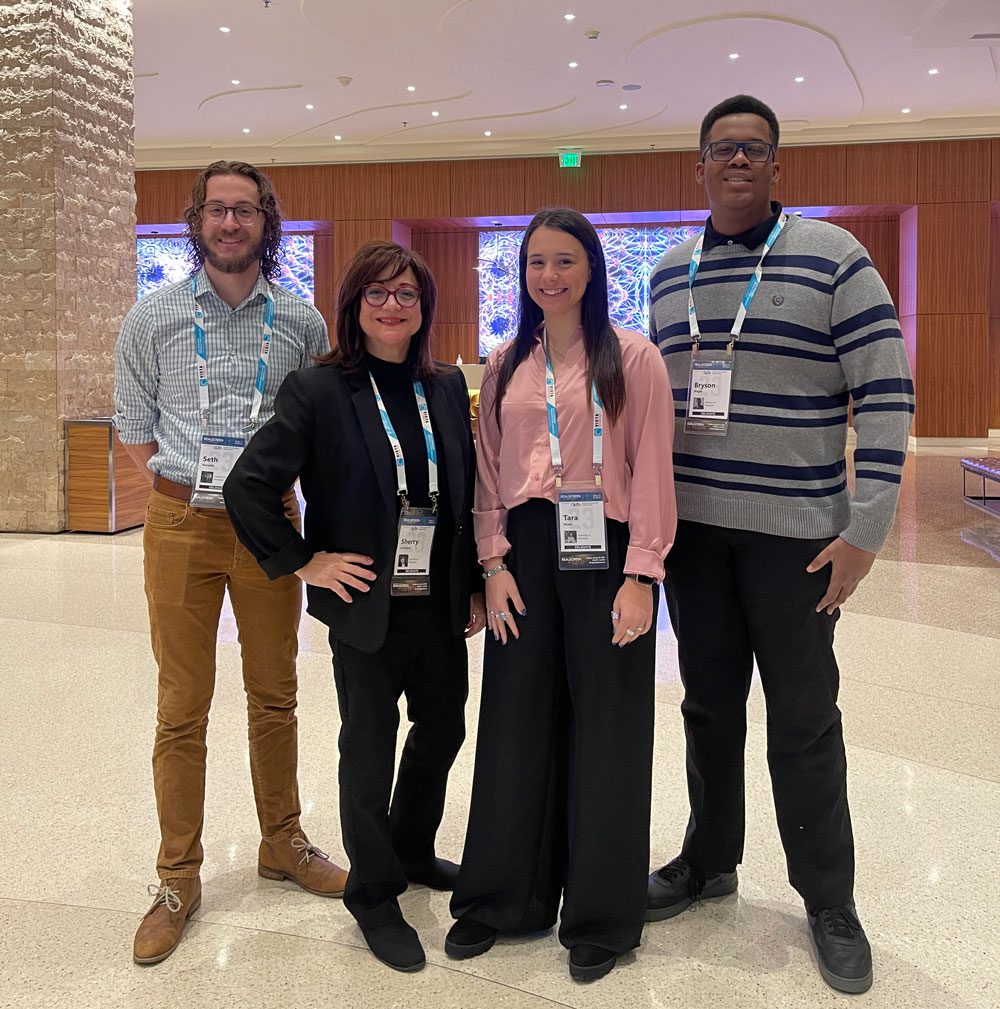From left, the Journalism and Electronic Media students who attended the Realscreen Summit: Seth Reynolds, Sherry Ludington, Tara Down, Bryson Wright
Every year, major buyers, production companies, and creators of unscripted and factual content gather at the Realscreen Summit to network, learn, and to find and elevate the next great idea. This year, four School of Journalism and Electronic Media students got the chance to be in the middle of this exciting event because founder of Jupiter Entertainment and College of Communication and Information alum Stephen Land (’76) sponsored their trip.
“I strongly feel that, in addition to the classroom material, having those real-world experiences is so beneficial,” Land said. “I think it’s intimidating when you first come out of school and you feel young and inexperienced and vulnerable, but when you can go there and press the flesh, so to speak, and see the people, you think, ‘I can do that.’”
That’s exactly the reaction the students from the Journalism and Electronic Media Creative Production Capstone had during their time at Realscreen Summit, said senior Sherry Ludington, who attended along with students Seth Reynolds, Tara Down, and Bryson Wright. They were accompanied by School of Journalism and Electronic Media lecturers Clint Elmore and Melissa Sykes, both of whom are industry professionals well acquainted with the world of unscripted and factual content.
Ludington is immensely grateful for both the trip and the capstone course. She noted that Land actually facilitated the creation of the course—which he said he wished existed when he was a student—by putting forth the course idea and donating funds for software and equipment. He also meets with the class in person at the beginning of the course, helps to arrange for guest lecturers, and participates in a panel of industry professionals that review the students’ work at the culmination of the semester.
Students in the Creative Production Capstone class all produced a short reel to accompany a pitch for either a documentary or nonfiction/unscripted show. Of those submitted and reviewed, the best four were chosen and those students were sent to Realscreen Summit. While they were there, they had the opportunity to dive right in as content creators and pitch
directly to networks, international distributors and production companies.
“I made a lot of contacts and our work was right up there with the professionals who were pitching. We were prepared, because in this class they prepared us professionally. This was not student work, it’s professional work,” Ludington said.
In fact, Ludington was asked by the representatives of OUTtv and The Nature TV program about a documentary and show she pitched, respectively, to discuss with them after the summit.
While it’s just the first stages of a long process to actually get a show produced and launched, it’s a necessary step that wouldn’t have happened without the networking this trip facilitated.
Having Land’s name backing the students was another boon, along with Sykes’ two decades of experience working as a vice president of new productions at HGTV, Ludington said. Their names made inroads at the summit, and veterans of the industry were generally interested in the students and their work.
“We were very transparent, I would say ‘I’m a student from the University of Tennessee.’ and I didn’t expect anyone to take their time with me. But they did, and not just with me, but with all our students. We had new ideas and they wanted to latch onto that,” she said. “It was absolutely heartwarming to just see how well-received the students were.”
Elmore said it was a great culmination of all the work the students did in their class, and affirmation that such a course readily prepares them to enter careers in this field. He says it’s not necessarily unique to teach students how to create a professional sizzle reel and pitch, but one advantage that JEM students have are connections to people such as Land, whose former company Jupiter grew to be one of the largest producers of unscripted content in the country by the time he sold it in 2015.
“We go beyond the nuts and bolts. We bring industry professionals in to give students insight into the process and expectations and to share their experiences. And usually, at the end of the semester, we bring in professionals to critique and give real-world feedback,” Elmore said.
Adding Realscreen Summit as a culminating experience to the class for those students who attended was just another boon to their future careers, he said, and he hopes it will be a trip that can be repeated in the future.
As for Land, he said he received many texts and emails from the students and lecturers who went, thanking him for the opportunity and relaying how valuable the experience was. While he didn’t fund the trip for the accolades, it nonetheless made him feel great to know his gift created a pivotal career point for many of the students.
“I can’t really speak to other career paths, but I just know in our world, in the media and content space, those real world experiences truly matter. We were delighted to help and I can’t say enough that the administrators at the college have been so keen to pursue it,” Land said.

